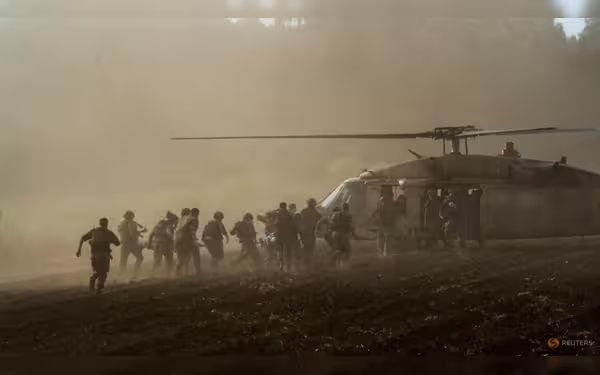Saturday, November 16, 2024 05:49 PM
US Issues Warning Against Middle East Escalation
- US warns against escalation in Middle East conflict.
- Hezbollah attacks result in significant casualties.
- Diplomatic efforts ongoing to reduce tensions.
 Image Credits: channelnewsasia
Image Credits: channelnewsasiaThe US warns all parties in the Middle East to avoid escalation amid rising tensions and significant casualties from Hezbollah attacks.
The Middle East has long been a region marked by conflict and tension, with various factions vying for power and influence. Recently, the situation has escalated, particularly between the Iran-backed Lebanese group Hezbollah and Israel. This ongoing strife has raised alarms not only in the region but also across the globe, prompting the United States to step in with a warning.
On September 19, 2023, the United States issued a stern warning to all parties involved in the Middle East, urging them to avoid further escalation of the conflict. The U.S. State Department emphasized that while it supports Israel's right to defend itself, it does not want to see any party intensify the ongoing hostilities. State Department spokesperson Matthew Miller stated, "We will continue to stand by Israel's right to defend itself, but we don't want to see any party escalate this conflict, period." This statement reflects the U.S. commitment to finding a diplomatic solution amidst rising tensions.
The backdrop of this warning is a series of deadly attacks attributed to Hezbollah, which have resulted in significant casualties. Reports indicate that these attacks have led to the deaths of 37 individuals and injured around 3,000 others, overwhelming hospitals in Lebanon and causing widespread chaos. The situation has become increasingly dire, with the potential for further violence looming large.
While the U.S. has been actively engaged in diplomatic efforts to reduce tensions since the outbreak of violence on October 7, Miller acknowledged the limitations of American diplomacy. He remarked, "We have been engaged in the region for some time, and of course, since October 7th we have been engaged to try to bring down tensions. But ultimately, yes, every country is responsible, and every entity is responsible for the actions that they take." This statement underscores the complexity of the situation, where multiple actors must take responsibility for their actions.
As the world watches the developments in the Middle East, it is crucial to understand the broader implications of this conflict. The potential for escalation not only threatens the stability of the region but also poses risks to global peace. It is a reminder that diplomacy, while challenging, remains an essential tool in resolving conflicts. The hope is that all parties will heed the warnings and work towards a peaceful resolution, prioritizing dialogue over violence.
The situation in the Middle East is a stark reminder of the fragility of peace in a region fraught with historical grievances and power struggles. As tensions rise, the call for calm and diplomatic engagement becomes ever more critical. The world must remain vigilant and supportive of efforts aimed at fostering understanding and cooperation among the conflicting parties, for the sake of not just the region, but for global stability as well.













